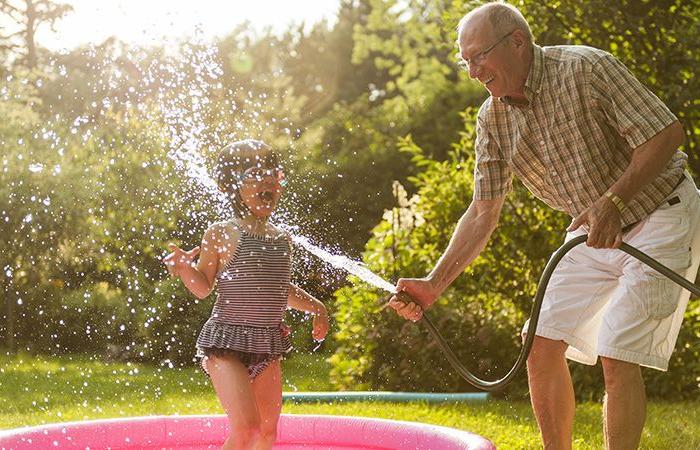With the arrival of summer also comes heat waves and the heatwave risk. A greater risk due to climate change that has begun in recent years. These heatwave episodes can be particularly dangerous for the health of most vulnerable people : the elderly, young children, pregnant women, people with disabilities or suffering from chronic illnesses or those taking certain medications, people in precarious situations. Isolation puts vulnerable people at greater risk. This article reminds you of the good gestures to adopt facing heat spikes for you protect and protect your loved ones.
A heat wave corresponds to a intense heat episode over more than three days with temperatures falling below 17°C at night and above 32°C during the day. Below these thresholds, we speak of heat peak (over one to two days) or persistent heat episodes when high temperatures persist over time.
Why is heat a risk for vulnerable people?
Heat waves represent a real danger for the population health, especially that of the most fragile. They can cause dehydrationa worsening of chronic diseases or some heat stroke (hyperthermia).
- THE the elderly may have a reduced perception of risk for themselves, which leads them to neglect preventive measures against the effects of heatwaves. Furthermore, their natural defense mechanisms against heat (sweating, vasodilation) work less well, just like in young children.
- THE people with chronic illnesses especially in cases of cardiovascular, renal, urinary, respiratory, neurodegenerative, endocrine and/or mental pathologies are more fragile. In addition, certain medications can increase the effects of heat or hinder the body’s adaptation to heat.
- THE people with disabilities or dependent are very vulnerable to heat because it is difficult for them to escape it on their own.
- THE precarious people or homeless suffer more from the consequences of high temperatures, because it can be difficult to have access to water, to a shaded place, isolated from the heat, etc.
- Prisoners, pregnant women, athletes, outdoor workers and people with obesity are often more vulnerable to heat waves.
Symptoms to know to detect dehydration :
- muscle cramps ;
- severe fatigue leading to dizziness and discomfort;
- difficulty sleeping;
- constipation ;
- weightloss ;
- arterial hypotension, tachycardia.
Heatstroke prevents the body from regulating its temperature, which can cause the following symptoms:
- hot, red, dry skin;
- headaches ;
- nausea;
- somnolences ;
- unusual aggressive behavior.
The right actions to take
To avoid risks to your health, simple actions allow you to avoid accidents before the first signs of dehydration or heat stroke.
Before the extreme heat episode:
- For the elderly: register, especially if you live alone, on the municipal register of the town hall where you live, in order to be contacted regularly and receive assistance if necessary;
- Check with your doctor, pharmacist or other healthcare professional if your treatment requires special monitoring or modification.
- Remember to find out about the weather forecasts on the site vigilance.meteofrance.fr.
Actions to take during a heatwave:
- Regularly check in on your loved ones, especially the most vulnerable;
- Organize with family, friends or neighbors to remain vigilant about the condition of the most vulnerable people around you;
- Avoid self-medication, ask your doctor or pharmacist for advice.

Watch your diet
- Drink regularly (without waiting until you are thirsty), preferably moderately mineralized water, 1.5 liters of water for the elderly;
- Choose gelled water or sparkling water for people who are on the wrong path;
- Do not consume alcohol;
- Avoid drinks with a high caffeine content such as coffee, tea or very sugary drinks like soda;
- Eat enough, in portions during the day if necessary;
- Eat a balanced diet, favoring foods rich in water (fruit, raw vegetables, cold soups, compotes, etc.);
- Avoid eating or drinking frozen products.
Adapt your accommodation
Some tips for staying cool at home:
- Protect windows from the sun: Close the shutters. In the absence of sunshading shutters: install light-colored curtains with thermal insulation;
- Close the windows during the day;
- When the windows are closed, for more comfort, you can use a fan to circulate the air.
- Ventilate in the evening, at night or very early in the morning, when the outside air is cooler than in the home;
- Avoid using heat sources (oven, stove, etc.)
Tips and advice for keeping a comfortable temperature at home on:
Adapt your behaviors
For old people :
- spend more hours in cool places;
- dress in suitable, light clothing;
- Wet your body regularly (spraying water on your face, using damp cloths, etc.).
For those caring for young children:
- keep the child in a cool environment;
- avoid taking them out during the hottest hours of the day;
- dress him in a suitable, light outfit and with a hat;
- make him drink regularly.
Precaution after the first signs of dehydration
In case of discomfort or uneasiness, contact the 15 (FIND) and ask a neighbor for help.
For caregivers
When faced with a dehydrated person, here are some simple actions:
- lay the person down;
- take off his clothes;
- refresh it with damp cloths;
- yearly
- feed him frequently with sweet and salty drinks.
Useful resources






